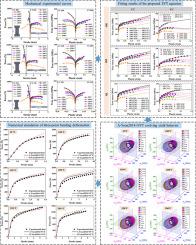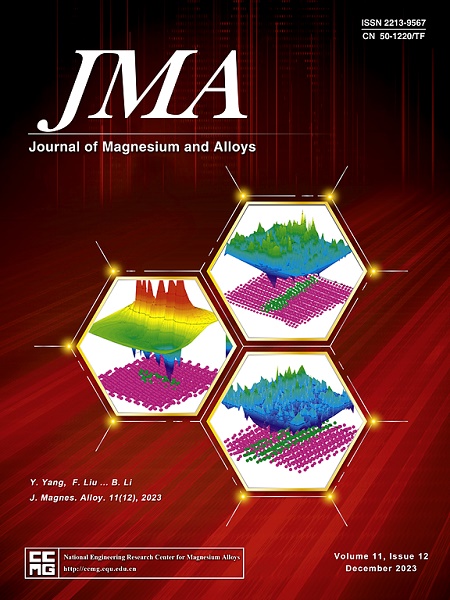Analytical model to characterize temperature-dependent anisotropic-asymmetric behavior of Mg-Gd-Y alloy
IF 15.8
1区 材料科学
Q1 METALLURGY & METALLURGICAL ENGINEERING
引用次数: 0
Abstract
The work is conducted to uncover and simulate the dependence of the evolving anisotropic-asymmetric yield behavior on the temperature for an Mg-Gd-Y alloy. Experiments were carried out at 25∼300 °C, including uniaxial tension and compression. The strength is observed to decrease non-linearly as the temperature increases. Thermal softening effect is not significant when the temperature is lower than 200 °C, but the strength decreases dramatically at high temperature than 250 °C. Tension-compression asymmetry and anisotropy are observed to be strongly and nonlinearly dependent on strain and temperature. The temperature effect is taken into account in a combined Swift-Voce (SVT) model to predict the temperature-dependent strain hardening behavior with a higher accuracy than the traditional Johnson-Cook and Zerilli-Armstrong equations. An analytical Yoon2014 (A-Yoon2014) yield function is established to capture the evolving anisotropic-asymmetric behavior with respect to strain and temperature. The predicted force-stroke curves of the A-Yoon2014+SVT model are closer to the experimental results of the three-point bending process than the numerical results of the original Yoon2014+SVT model. Given its user-friendliness and high accuracy for the modeling of temperature-dependent anisotropic-asymmetric hardening behavior, the A-Yoon2014+SVT model is recommended to be utilized in the numerical simulation of plastic forming process for hexagonal close-packed metals.

表征Mg-Gd-Y合金温度相关各向异性-不对称行为的分析模型
本研究揭示并模拟了Mg-Gd-Y合金各向异性-非对称屈服行为的演化与温度的关系。实验在25 ~ 300°C下进行,包括单轴拉伸和压缩。强度随温度升高呈非线性下降。当温度低于200℃时,热软化效果不明显,但当温度高于250℃时,强度急剧下降。拉伸-压缩不对称性和各向异性与应变和温度有强烈的非线性关系。在结合swift - voice (SVT)模型中考虑了温度效应,以比传统的Johnson-Cook和zerili - armstrong方程更高的精度预测温度相关的应变硬化行为。建立了解析性Yoon2014 (A-Yoon2014)屈服函数,以捕捉随应变和温度变化的各向异性-不对称行为。A-Yoon2014+SVT模型预测的力行程曲线比原Yoon2014+SVT模型的数值结果更接近三点弯曲过程的实验结果。考虑到A-Yoon2014+SVT模型对温度相关的各向异性非对称硬化行为建模的易用性和准确性,建议将其用于六边形密排金属塑性成形过程的数值模拟。
本文章由计算机程序翻译,如有差异,请以英文原文为准。
求助全文
约1分钟内获得全文
求助全文
来源期刊

Journal of Magnesium and Alloys
Engineering-Mechanics of Materials
CiteScore
20.20
自引率
14.80%
发文量
52
审稿时长
59 days
期刊介绍:
The Journal of Magnesium and Alloys serves as a global platform for both theoretical and experimental studies in magnesium science and engineering. It welcomes submissions investigating various scientific and engineering factors impacting the metallurgy, processing, microstructure, properties, and applications of magnesium and alloys. The journal covers all aspects of magnesium and alloy research, including raw materials, alloy casting, extrusion and deformation, corrosion and surface treatment, joining and machining, simulation and modeling, microstructure evolution and mechanical properties, new alloy development, magnesium-based composites, bio-materials and energy materials, applications, and recycling.
 求助内容:
求助内容: 应助结果提醒方式:
应助结果提醒方式:


